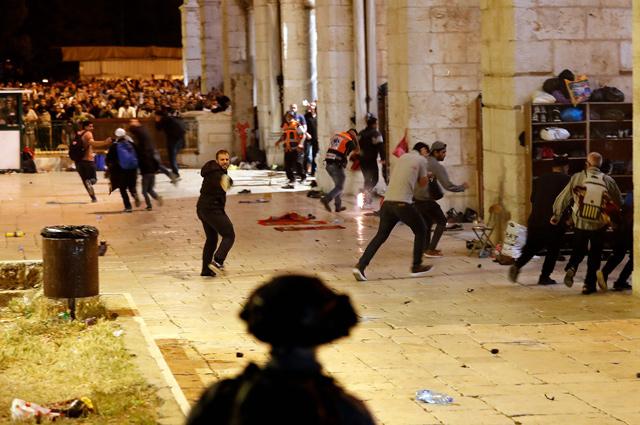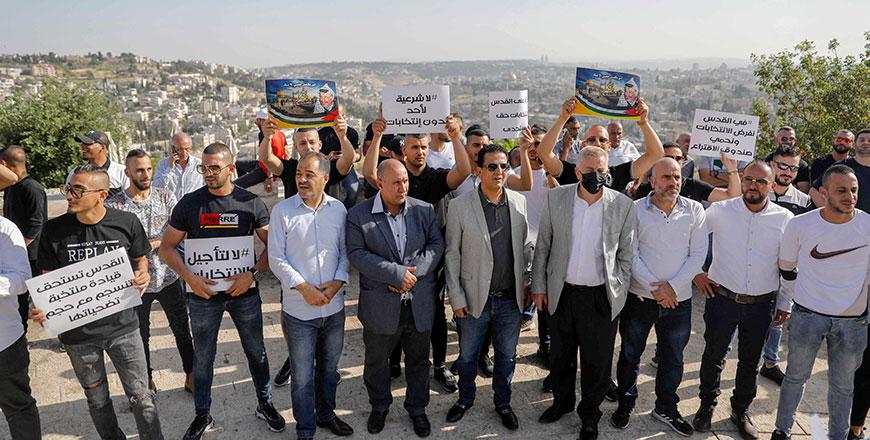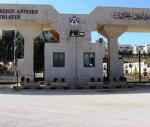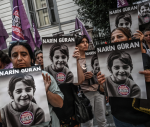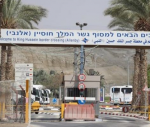You are here
Occupation forces remove East Jerusalem barricades after protests
By AFP - Apr 27,2021 - Last updated at Apr 27,2021
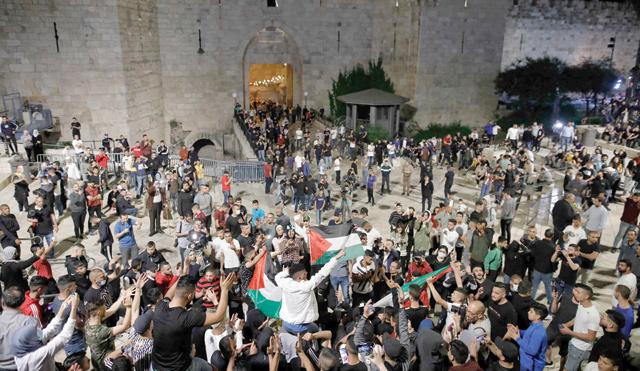
Palestinian protesters raise national flags as they gather near the Damascus Gate in Jerusalem's Old City on Sunday (AFP photo)
OCCUPIED JERUSALEM — Israeli occupation authorities on Sunday allowed Palestinians to gather in a flashpoint plaza outside Jerusalem's walled Old City, in a move apparently aimed at easing tensions after days of clashes.
The staired plaza outside Damascus Gate in Israeli-Occupied East Jerusalem is a traditional gathering spot for Palestinians during the Muslim holy month of Ramadan.
Jerusalem, a perennial powder-keg of religious tension, has seen some of its worst violence in years over recent days, triggered in part by an Israeli decision to block Palestinians from gathering on the Damascus Gate steps following prayers.
But as crowds were building in the plaza on Sunday, Commissioner Kobi Shabtai ordered the barricades be removed.
The decision came "following consultations with local leadership, religious leadership, situation assessments, while taking into consideration the shop owners who need to make a living, and in order to lower the level of violence", a spokesman told AFP.
"Our forces are still deployed on the ground, and we won't let violence resurge," the spokesman said.
Hundreds of Palestinians, including male youths who tossed the barricades to the side, held celebratory rallies in the plaza, watched over by police.
Minor scuffles erupted after some of the revellers began waving Palestinian flags, moves which prompted police to storm the plaza.
AFP reporters saw several young Palestinians being detained by police.
But the plaza remained open, with police maintaining a heavy presence in the area into the early hours on Monday.
Samir Gheith, a 66-year-old Palestinian from Jerusalem, said people had been looking forward to gathering at Damascus Gate during Ramadan after it was closed last year due to coronavirus restrictions.
“I think they don’t want to see us be happy,” he told AFP, referring to the initial decision to barricade the plaza.
“But then they came to understand that they needed to put a stop to all these tensions,” he said.
There have been nightly disturbances since the start of Ramadan on April 13.
Tensions rose on Thursday when far-right Israeli demonstrators marched to the Old City with chants of “death to Arabs”.
More than 100 Palestinians were wounded in clashes with occupation forces and dozens were arrested.
The violence was the worst in years between Israeli authorities and Palestinians in the disputed Holy City, with Palestinians throwing stones and bottles at officers, who responded with stun grenades and water cannon.
Skirmishes broke out again on Friday after Muslim worshippers left Jerusalem’s revered Al Aqsa Mosque following night prayers.
Jewish extremists in return took to the streets to bully Arabs, with police arresting dozens involved in the attacks.
Overnight Friday into Saturday, Palestinian militants in Gaza fired dozens of rockets at southern Israel, with the military wing of Hamas, the Islamist rulers of the Palestinian enclave, voicing support for the East Jerusalem protesters.
In the early hours of Monday, the Israeli forces said at least four rockets had been fired from Gaza towards Israel, of which two were intercepted by Israel’s Iron Dome air defence system.
Two of them exploded inside the Gaza Strip, the Israeli forces said.
Related Articles
OCCUPIED JERUSALEM — Adnan, a Palestinian from East Jerusalem, vowed rubber bullets fired by Israeli police would not deter him: "Silence is
OCCUPIED JERUSALEM — Israel braced for more protests on Saturday after clashes at Jerusalem’s flashpoint Al Aqsa Mosque compound wounded mor
RAMALLAH, Palestinian Territories — Palestinian leaders were set to decide on Thursday whether to hold elections next month as scheduled or


